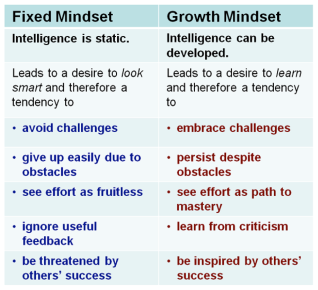Mindset is a simple idea discovered by world-renowned Stanford University psychologist Carol Dweck in decades of research on achievement and success—a simple idea that makes all the difference.
Carol Dweck, a world-renowned Stanford University psychologist, during decades of research on achievement and success, proposed the idea that all people have either of two mindsets, -a “fixed” mindset, or a “growth” mindset. This is a simple idea that can make all the difference.
Fixed Mindset: People believe their basic qualities, like their intelligence or talent, are simply fixed traits. They spend their time documenting their intelligence or talent instead of developing them. They also believe that talent alone creates success—without effort. They’re wrong.
Growth Mindset: People believe that their most basic abilities can be developed through dedication and hard work—brains and talent are just the starting point. This view can create a love of learning and a resilience that is essential for great accomplishment. Virtually all great people have had these qualities.
“Before you are a leader, success is all about growing yourself. When you become a leader, success is all about growing others.” ~Jack Welch
A Leader’s Mind: L.E.A.D.E.R.S.H.I.P
L: Love-based Motivation: Motivation based on feeling valued in the job.
- Why do you think the majority of heart attacks occur on Monday mornings? One study showed that the most common factor in these heart attacks was that the victims were people whose work had become joyless striving. In other words, they couldn’t find meaning in their work, and their lives had become so out of balance that, one Monday morning, their bodies said, You are not going to work today. The role of leadership can either be Fear-based or Love-based. The decision is yours.
E: Emotional Intelligence: A leader’s abilities to perceive, identify, understand, and successfully manage emotions in themselves and others; The more self-awareness that leaders have, the higher will be their awareness of the emotions of others around them.
A: Accountable: Accountability comes from the presence of trust and the absence of fear. Leaders keep themselves accountable before holding others accountable. They define and clarify roles, goals and expectations for the team.
D: Developing Others: Leaders can really make their marks by creating cultures of development within their teams and supporting people who seek opportunities for development. Leaders developing other leaders understand transformational leadership.
E: Enabler: Enabling others is key to develop them;
- Getting acquainted
- Asking questions
- Listening
- Identifying needs and interests
- Expressing feelings
- Being sensitive to others
R: Righteousness: “The lips of the righteous feed many, but fools die for lack of wisdom.” – Proverbs 10:21 A good leader is a wise leader and wisdom is found in God and His word.
How would the desire to seek Righteousness improve your relationships? What part does Righteousness play in your relationships with your team members, friends, co-workers and family?
S: Servanthood: True leadership is servanthood, and the greatest leader of all time is Jesus Christ. Servanthood is an attitude exemplified by him. “For even the Son of Man did not come to be served, but to serve, and to give His life a ransom for many” (Mark 10:45)
H: Humility: Humility is an important human quality. But did you know that humility can help you be a better leader, too?
- Jim Collins, an influential consultant and author, wrote about humility and leadership in his groundbreaking book, “From Good to Great.”
- He found that, in the top-performing companies he identified, leaders had humility in abundance; they shared credit for success, and they were the first to accept blame for mistakes.
I : Independent thinking: Questioning assumptions and interpreting data and events according to one’s own beliefs, ideas, and thinking, rather than pre-established rules or categories defined by others
P: Personal Mastery: The discipline of personal growth and learning and of mastering yourself, it embodies personal visions, facing reality and holding creative tension.
Are Leaders Born or Made?
- When Warren Bennis interviewed great leaders, “they all agreed leaders are made, not born, and made more by themselves than by any external means.” Bennis concurs: “I believe.. that everyone, of whatever age and circumstance, is capable of self-transformation.” Not that everyone will become a leader. Sadly, most managers and even CEOs become bosses, not leaders. They wield power instead of transforming themselves, their workers, and their organization.
A leader’s mind is focused on self-awareness, self-accountability, growing himself, and serving others by coaching, teaching, and influencing them. A leader’s mind can see and visualize a vision clearly, and as a result, they act before others do, they see before others see, and their selfless character will influence others to also become part of that big vision.
I am LinkedIn: http://www.linkedin.com/in/farshadasl

